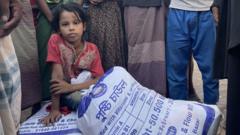Local organizations like Nari Maitree, which have been pivotal in providing healthcare, nutrition, and financial assistance to those afflicted, are now unable to continue due to loss of funding. Reports indicate that over 80% of USAID programs in Bangladesh are officially ending, impacting thousands of existing and potential TB cases, as well as other healthcare initiatives vital for reducing child and maternal mortality.
Job losses are rampant, with one of the affected workers, Dipa, expressing her despair over losing employment and the financial burden it brings to her family. The cuts have triggered chaos in the aid sector, exacerbating an already dire economic situation in Bangladesh amidst inflation and political instability.
Furthermore, the aid cuts severely impact the world's largest refugee camp in Cox's Bazar, home to over a million Rohingya displaced by violence. Many of these refugees, who rely on international support for basic needs, face immense challenges as critical supplies dwindle. UNICEF warns of an impending humanitarian disaster, with reports of disease outbreaks and dwindling food rations threatening the health and stability of these vulnerable populations.
The whirlwind of sudden aid cuts not only puts health at risk but also endangers the lives and futures of those who depend on it for survival, painting a grim picture of the consequences of foreign aid reduction in Bangladesh.
Job losses are rampant, with one of the affected workers, Dipa, expressing her despair over losing employment and the financial burden it brings to her family. The cuts have triggered chaos in the aid sector, exacerbating an already dire economic situation in Bangladesh amidst inflation and political instability.
Furthermore, the aid cuts severely impact the world's largest refugee camp in Cox's Bazar, home to over a million Rohingya displaced by violence. Many of these refugees, who rely on international support for basic needs, face immense challenges as critical supplies dwindle. UNICEF warns of an impending humanitarian disaster, with reports of disease outbreaks and dwindling food rations threatening the health and stability of these vulnerable populations.
The whirlwind of sudden aid cuts not only puts health at risk but also endangers the lives and futures of those who depend on it for survival, painting a grim picture of the consequences of foreign aid reduction in Bangladesh.




















